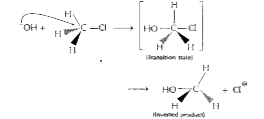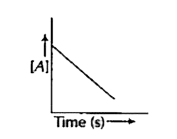How would you differentiate between SN1andSN2 mechanism of substitution reactions? Give one example of each. Solution in Odia
In SN1 mechanism of substitution reaction, the rate of reaction depends upon the concentration of only one reactant, e.g, in the reaction between tert-butyl bromide and hydroxide ion to form tert-butyl alcohol, rate of reaction depends only on the concentration of tert-butyl bromide.
(CH3)3C−Br+OH−→(CH3)3C−OH+Br−
It involves the formation of carbocation intermediate and racemisation.
In SN2 mechanism of substitution reaction, the rate of reaction depends upon the concentration of both the reactants, e.g. in the reaction between methyl chloride and hydroxide ion to form methanol, rate of reaction depends on the concentration of both the reactants.

It involves the formation of transition state and inversion (Walden inversion) of configuration.
Topper's Solved these Questions
- SAMPLE PAPER 1 BOOK - ARIHANT PUBLICATIONCHAPTER - SAMPLE PAPER 1 EXERCISE - GROUP C
14 Videos
- SAMPLE PAPER 1 BOOK - ARIHANT PUBLICATIONCHAPTER - SAMPLE PAPER 1 EXERCISE - GROUP A
7 Videos
- QUESTION PAPER 2019BOOK - ARIHANT PUBLICATIONCHAPTER - QUESTION PAPER 2019EXERCISE - GROUP C
11 Videos
- SAMPLE PAPER 4 BOOK - ARIHANT PUBLICATIONCHAPTER - SAMPLE PAPER 4 EXERCISE - GROUP C
7 Videos
Similar Questions
A strip of nickel metal is dipped in a 1 molar solution of Ni(NO3)2 and a strip of silver metal is dipped in a 1 molar solution of AgNO3. An electrochemical cell is created when the two solutions are joined by salt bridge and two strips are joined by wire to a voltmeter.
Answer the following questions.
Write the balanced equation for the overall cell reaction and calculate the cell potential.
View SolutionWhich noble gas is used in atomic reactor ?
View SolutionWhat are oil in water and water in oil type of emulsions ? Give one example of cach type.
View SolutionConsider the reaction, Ak−−→P. The change in the concentration of A with time is shown in the following plot:

(a) Derive the expression for the time required for the completion of the reaction.
(b) Predict the order of the reaction.
View SolutionExplain the mechanism of S_(N^(1)) and S_(N^(2)) reactions with examples.
View SolutionHow would you differentiate between aggregate fruits and composite fruits ? Give one example of each.
View Solutionऐल्किल हैलाइड्स न्यूक्लियोफिलिक प्रतिस्थापन अभिक्रिया क्यों देते है ? उनके द्वारा प्रदर्शित SN1 व SN2 अभिक्रियाओं की क्रियाविधि का वर्णन कीजिए ।
View Solutionऐल्किल हेलाइडो में नाभिकसनेही प्रतिस्थापन SN1औरSN2 अभिक्रिया की क्रियाविधि समझाइए ।
View SolutionCompare SN1andSN2 reaction mechanisms.
View SolutionCompare S_(N^1)and S_(N^2 reaction mechanisms.
View SolutionHow would you differentiate between S_(N)1 and S_(N)2 mechanisms of substitution reactions? Give one example of each.
View Solution(a) How will you differentiate between SN1 and SN2 reactions?
(b) Why does the treatment of alkyl chloride with silver nitrate form nitroalkane and with potassium nitrite form alkyl nitrite?
View SolutionHow would you differentiate between SN1 and SN2 mechanisms of substitution reactions? Give one example of each.
View Solution(a) How will you differentiate between S_(N)1 and S_(N)2 reactions? (b) Why does the treatment of alkyl chloride with silver nitrate form nitroalkane and with potassium nitrite form alkyl nitrite?
View SolutionHow would you differentiate between SN1 and SN2 mechanisms of substitution reactions ? Give one example of each.
View SolutionDiscuss SN1 mechanism
View Solution
